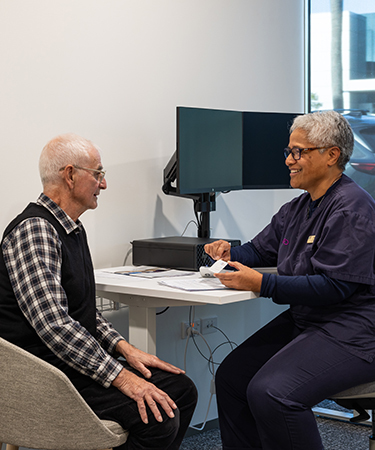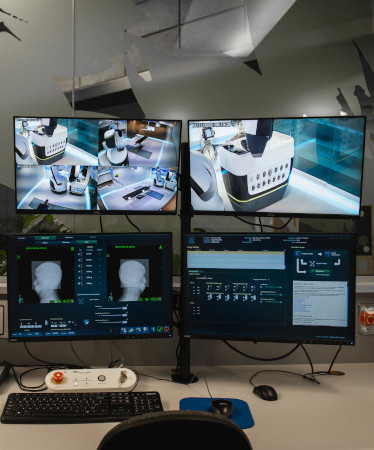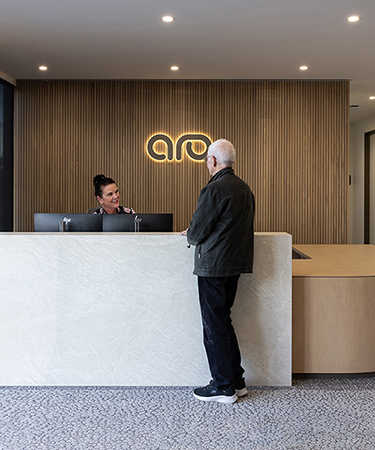Physiotherapy
A physiotherapist who is an expert in cancer rehabilitation aims to help you regain your quality of life by helping you manage potential side effects more effectively before, during and after treatment. The nature of support from the physiotherapist will depend on your diagnosis and treatment plan. A customised plan will be developed with you to suit your needs.
We recommend you include physiotherapy support at all stages of the treatment pathway. There is clear evidence that patients who incorporate physiotherapy as part of their treatment are stronger and usually experience side effects to a lesser degree. You may contact a physiotherapist at any stage of the treatment pathway. Some costs may be incurred. Chat to one of your ARO nurses for a recommendation.
Physiotherapy treatment is especially effective for patients undergoing radiotherapy treatment for breast, prostate, and head and neck cancers (for specific details scroll below).
Benefits include:
● Regaining and maintaining range of movement (i.e. flexibility to carry out the activities you used to find easy)
● Regaining strength and stability
● Release the tightness caused by scar tissue
● Decreased pain
● Incontinence issues follow cancer treatments for prostate and gynaecological cancers
● Managing dysfunction (e.g. erectile dysfunction)
● Better management of tiredness
● Regain quality of life and return to work, sport and fun
Can I get funding for physiotherapy treatment?
If you have private health insurance, we encourage you to check whether you are eligible for physiotherapy treatment as part of your treatment plan, all post surgical rehabilitation includes physiotherapy as part of the treatment. Depending on your policy and provider, you may be covered to receive these supplementary services before surgery, after surgery or during and after radiation therapy.
In some situations, you may have undergone surgery prior to coming to ARO for radiation therapy. Please contact your private health insurance provider to confirm if you are eligible for post-surgery rehabilitation.
Referrals
Referrals can also be made from your radiation oncologist, nurse, radiation therapist or specialist e.g. urologist, breast surgeon. Depending on the type of cancer you are having treated, you may also apply for funding from the Breast Cancer Foundation, Pinc & Steel cancer rehab and The NZ Prostate cancer foundation. Return to form are also a Sweet Louise and Pinc & Steel provider for cancer rehabilitation.
Breast Cancer
Before starting treatment
Each patient is unique, together with the physio you will set some goals and develop a plan that is tailored to your needs. This will include a customised range of exercises that are appropriate and safe for you. The core purpose of having physiotherapy prior to the start of your treatment is to establish a baseline of your strength and movement.
During treatment
There are a range of side effects that may potentially develop over the course of the treatment. The aim of the physio sessions during treatment is to help manage and minimise the side effects:
1. Maintain and improve range of movement in general, and in areas such as the neck and shoulder.
2. Regain, maintain or strengthen muscles.
3. Decrease pain as appropriate
4. Help manage lymphedema. Lymphedema refers to swelling that generally occurs in one of your arms and is commonly caused by the removal of or damage to your lymph nodes as a part of cancer treatment.
5. Manage cording. Cording, also known as axillary web syndrome, can happen weeks or months after breast-conserving surgery, mastectomy or axillary surgery. It feels like a tight cord running from your armpit down the inner arm, sometimes to the palm of your hand, and is caused by hardened lymph vessels.
After treatment
The core objective will be to help you improve your quality of life by helping you regain strength and movement overall and in specific areas. If you had physio sessions prior to treatment, we can review your status against the baseline.0
Prostate Cancer
Before starting treatment
The core purpose of seeing a physiotherapist prior to the start of your treatment is to establish a programme prior to your radiation treatment. These exercises are focussed on strengthening your pelvic floor resulting in better bladder control and limiting the side effects of sexual dysfunction.
During treatment
Physiotherapy is a very effective way to help manage potential side effects. The programme of exercises will be tailored and may change depending on the nature of the side effects.
By having physiotherapy many patients regain quality of life faster, and experience:
● Less frequency of going to the toilet
● Better bladder control
● No need to wear pads
● Sleep through the night
● Limit the side effects of sexual dysfunction
In some cases, the above may not be achieved immediately. Depending on the individual the introduction of physiotherapy means the patient can often lessen or overcome the side effects. The best results are achieved for those patients that engage a physiotherapist prior to starting radiation treatment.
After treatment
The core objective will be to help you improve your quality of life by helping you improve or regain quality of life.
Head and Neck Cancers
Before starting treatment
The core purpose of seeing a physiotherapist prior to the start of your treatment is to establish a programme prior to your radiation treatment.
During treatment
Physiotherapy is a very effective way to help manage potential side effects. The programme of exercises will be tailored and may change depending on the nature of the side effects. Depending on the individual the introduction of physiotherapy means the patient can often lessen or overcome the side effects. The best results are achieved for those patients that engage a physiotherapist prior to starting radiation treatment.
After treatment
The core objective will be to help you improve your quality of life by helping you improve or regain quality of life.
Downloads

Understanding Your Treatment
The Patient Pathway
We understand you may be anxious about having radiation therapy. Read about the patient pathway and what to expect before, during and after radiation therapy treatment. At ARO we work closely with your radiation oncologist to develop an individualised treatment plan for each patient.
Explore the patient pathway




